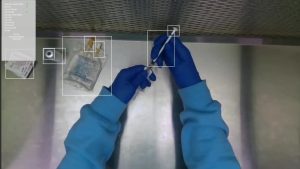November 30, 2022

The University of North Carolina at Chapel Hill, through the Eshelman Institute for Innovation, within the UNC Eshelman School of Pharmacy, announced a collaboration with Amazon Web Services (AWS) to build an environment for startup creation that uses cloud technology to translate UNC-Chapel Hill digital health research expertise into commercialized solutions.
The collaboration will support 25 projects over 3 years, with the goal of creating, funding, and building 10 successful start-up companies based out of UNC-Chapel Hill. The focus is software-forward digital technologies to advance health and wellness, enhance patient and provider experience, and improve healthcare access across five areas:
- Enterprise Systems & Support: platforms for healthcare systems, clinics, and other enterprise settings
- Clinician Services & Support: platforms primarily for clinicians and clinical support staff
- Patient-Facing Wellness & Support: products that capture, store, or transmit clinical information to guide care
- Patient-Facing Diagnostic & Monitoring: products used to diagnose, guide diagnosis of, or monitor patients
- Patient-Facing Therapeutic Interventions: products that deliver medical interventions and therapies
Through the collaboration, faculty from UNC-Chapel Hill’s health research labs utilize a cloud-native “software factory” to build solutions into production-ready formats that run on AWS. With services like Amazon SageMaker and Amazon Rekognition, as well as secure environments, data solutions, and other artificial intelligence (AI)/machine learning (ML) managed services, researchers develop innovative healthcare technologies that can be validated and then commercialized via University-born startups.
“AWS is leading the way in making software development much easier than it has ever been. Many AWS solutions require little to no coding, which makes innovation more accessible to our talented faculty,” said Christopher Clemens, UNC-Chapel Hill provost and chief academic officer. “This new collaboration is the perfect marriage for University faculty and researchers who do not have a deep software developer background but have the ideas and research in place to advance healthcare.”
Selected projects are eligible to receive AWS Computing Credits and collaborate with AWS solutions architects and specialists across domains like cybersecurity, biomedical research, high-performance computing, and machine learning for health informatics. AWS engineers provide an architectural approach that contains multiple pipelines equipped with tools, process workflows, scripts, and environments to produce software and infrastructure solutions that are portable, extensible, and secure by design—especially through the utilization of software containerization and microservices. This helps protect UNC Chapel-Hill’s intellectual property, extend research into the market, and grow research-driven impacts through high-quality, rapidly-deployed software.
“Many of our researchers are developing transformative AI/ML algorithms that can help advance precision medicine and digital therapeutics,” said Eshelman Institute for Innovation’s Bob Dieterle, managing director of UNC-Chapel Hill’s Digital Health Venture Studio. “With this approach, researchers can drop algorithms into a reusable container, snap together a mobile app front end along with a secure backend database, and deploy directly to enrolled patients in their studies.”
Eight of the 25 planned projects have recently kicked off to address important needs. One example is leveraging advanced AI technology to aid in product safety and quality assurance. Contamination issues with compounded medicines can lead to serious illness or death. To address this, researchers from the UNC Eshelman School of Pharmacy are using Amazon Rekognition to develop a computer vision solution based on the aseptic technique (a set of rules to minimize risk of infection). With this cloud-based AI technology, researchers can monitor movements during the sterile compounding process, compare the movements against established best practices, and generate reports that indicate breaches of technique and steps to resolve. This technology can be used for training, ongoing competency assessments, and regulatory documentation.
“Cloud-based digital platforms are integral to the future of healthcare delivery,” said Faisal Hanafi, Director, U.S. State and Local Government and Education Verticals, AWS. “The digital health research being done at UNC-Chapel Hill has the potential to be transformative for patients and clinicians alike, and AWS is excited to be collaborating with their talented faculty to provide services and expertise that accelerates their innovation.”
Projects are selected by a steering committee comprised of the Eshelman Institute for Innovation, the UNC-Chapel Hill Office of Technology Commercialization, UNC-Chapel Hill Information Technology Services, and Amazon Web Services. For more information, visit UNC’s Eshleman Institute for Innovation’s website or contact the team.
Latest News

RASP poster presentations capture student research

Delesha Carpenter promoted to full professor


